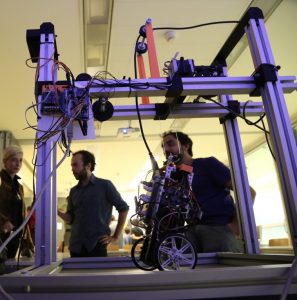The dominant view in neuroscience interprets the ability of the brain to produce anticipatory actions as a sensory-motor process driven by errors in motor performance: an error in behavior triggers corrective motor commands that are executed before the less optimal action is realized. Verschure and colleagues challenge this dominant account of anticipatory motor control and advance a novel answer to this question based on a theoretical model. This alternative model is necessary because the traditional models based on the direct acquisition or motor commands do not sufficiently account for the dependence of action on intentions of the agent and context. Actions driven by sensory predictions are indeed more robust to the uncertainty of the environment and they can be generalized to different body configurations without being retrained.
According to Maffei et al. (2017) animals seamlessly and unconsciously control their body based on an internal simulation of what the world will be like just after motor actions are realized. Lower level motor systems that are specialized in fast movement generation, react as if this brain generated simulation is actual. Through learning, this internal simulation will get more and more precise in predicting the future and the motor systems that respond to it better tuned to how the body interacts with the real world. In other words, our ability to generate anticipatory actions stem from the ability of the brain to internally predict the future and process those predictions as relevant information attend and react to. Adaptive fast and skilled motor action thus result from the surprising ability of the brain to simulate the future. The idea of the brain as a predictive system as such is not new and indeed the brain theories that Verschure and Friston have independently proposed. The model advanced by Maffei et al realizes this unification of the Free Energy framework of Karl Friston and the Distributed Adaptive Control theory of Verschure by integrating results from neuroanatomy and physiology, experimental psychology, robotics, and control engineering.
Reference
